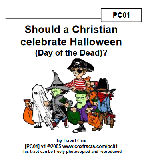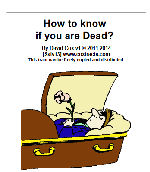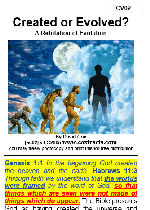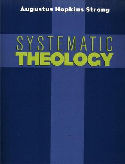Ads
A study on False Prophets and Teachers is excerpted from some good old books about false prophets and teachers.
taken from http://www.sounddoctrine.net/apologetics.html
A cult becomes destructive when:
¨ It isolates members from family and friends.
¨ The group interferes with an individual’s ability to think freely.
¨ A charismatic figure dominates the group, claiming to have a direct line to God or some secret knowledge that makes the group elite.
¨ The cult persuades members that the group goal is more important than individual needs, using guilt and shame to keep followers from questioning doctrine.
¨ The leader instills fear that something dreadful will happen to anyone who leaves.
Contents
Seven Characteristics of False Teachers1
by Thomas Brooks
Satan labors might and main, by false teachers, which are his messengers and ambassadors, to deceive, delude, and forever undo the precious souls of men.1
“Moreover, among the prophets of Samaria I saw an offensive thing: they prophesied by Baal and led My people Israel astray.”2
“…the prophets who lead my people astray…”3
They seduce them, and carry them out of the right way into by-paths and blind thickets of error, blasphemy, and wickedness, where they are lost forever.
“Beware of the false prophets, who come to you in sheep’s clothing, but inwardly are ravenous wolves.”4
These lick and suck the blood of souls. “Beware of the dogs, beware of the evil workers, beware of the false circumcision.”5
These kiss and kill; these cry, Peace, peace, till souls fall into everlasting flames.6
Now the best way to deliver poor souls from being deluded and destroyed by these messengers of Satan is, to discover them in their colors, that so, being known, poor souls may shun them, and fly from them as from hell itself.
Now you may know them by these characteristics following:
1. The first characteristic False teachers are men-pleasers.7
They preach more to please the ear than to profit the heart.
“Who say to the seers. ‘You must not prophesy to us what is right, speak to us pleasant words, prophesy illusions.'”8 “An appalling and horrible thing has happened in the land: the prophets prophesy falsely, and the priests rule on their own authority; and My people love it so! But what will you do at the end of it?”9 They handle holy things rather with wit and dalliance than with fear and reverence. False teachers are soul-undoers. They are like evil chirurgeons,10 that skin over the wound, but never heal it. Flattery undid Ahab and Herod, Nero and Alexander. False teachers are hell’s greatest enrichers. Not bitter, but flattering words do all the mischief, said Valerian, the Roman emperor. Such smooth teachers are sweet soul-poisoners.11
2. The second characteristic
False teachers are notable in casting dirt, scorn, and reproach upon the persons, names, and credits of Christ’s most faithful ambassadors.
Thus Korah, Dathan, and Abiram charged Moses and Aaron that they took too much upon them, seeing all the congregation was holy.12 You take too much state, too much power, too much honor, too much holiness upon you; for what are you more than others, that you take so much upon you? And so Ahab’s false prophets fell foul on good Micaiah, paying of him with blows for want of better reasons.13
Yea, Paul, that great apostle of the Gentiles, had his ministry undermined and his reputation blasted by a false teacher. “For they say, ‘His letters are weighty and strong, but his personal presence is unimpressive, and his speech contemptible.”14 They rather view him with contempt than admire him; they look upon him as a dunce rather than a doctor. And the same hard measure had our Lord Jesus from the scribes and Pharisees, who labored as for life to build their own credit upon the ruins of his reputation. And never did the devil drive a more full trade this way than he does in these days.
Oh! the dirt, the filth, the scorn that is thrown upon those of whom the world is not worthy! I suppose false teachers mind not that saying of Augustine: He that willingly takes from my good name, unwillingly adds to my reward.
3. The third characteristic
False teachers are inventors of the devices and visions of their own heads and hearts.15
“Then the Lord said to me, ‘The prophets are prophesying falsehood in My name. I have neither sent them nor commanded them nor spoken to them; they are prophesying to you a false vision, divination, futility and the deception of their own minds.'”16
“Thus says the Lord of hosts, ‘Do not listen to the words of the prophets who are prophesying to you. They are leading you into futility; they speak a vision of their own imagination, not from the mouth of the Lord.'”17
Are there not multitudes in this nation whose visions are but golden delusions, lying vanities, brain-sick fantasies? These are Satan’s great benefactors, and such as divine justice will hang up in hell as the greatest malefactors, if the Physician of Souls does not prevent it.
4 The fourth characteristic
False teachers easily pass over the great and weighty things both of law and gospel and stand most upon those things that are of the least moment and concernment to the souls of men.18
“But the goal of our instruction is love from a pure heart and a good conscience and a sincere faith. For some men, straying from these things, have turned aside to fruitless discussion, wanting to be teachers of the Law, even though they do not understand wither what they are saying or the matters about which they make confident assertions.”19
“Woe to you, scribes and Pharisees, hypocrites! For you tithe mint and dill and cumin, and have neglected the weightier provisions of the law: justice and mercy and faithfulness; but these are the things you should have done without neglecting the others.”20
False teachers are nice in the lesser things of the law and as negligent in the greater. “If anyone advocates a different doctrine and does not agree with sound words, those of our Lord Jesus Christ, and with the doctrine conforming to godliness, he is conceited and understands nothing; but he has a morbid interest in controversial questions and disputes about words, out of which arise envy, strife, abusive language, evil suspicions, and constant friction between men of depraved mind and deprived of the truth, who suppose that godliness is a means of gain.”21 From such you must withdraw yourself.
If such teachers are not hypocrites in temperament, I know nothing.22 The earth groans to bear them, and hell is fitted for them.
5 The fifth characteristic
False teachers cover and color their dangerous principles and soul-impostures with very fair speeches and plausible pretenses, with high notions and golden expressions.
Many in these days are bewitched and deceived by the magnificent words, lofty strains, and stately terms of deceivers, viz. illumination, revelation, deification, and fiery triplicity. As [whores] paint their faces, and deck and perfume their beds, the better to allure and deceive simple souls,23 so false teachers will put a great deal of paint and garnish upon their most dangerous principles and blasphemies, that they may the better deceive and delude poor ignorant souls. They know sugared poison goes down sweetly; they wrap up their pernicious, soul-killing pills in gold.
In the days of Hadrian the emperor, there was one Ben-Cosbi gathered a multitude of Jews together, and called himself Ben-concuba, the son of a star, applying that promise to himself,24 but he proved Bar-chosaba, the son of a lie. And so will all false teachers, for all their flourishes prove at the last the sons of lies.
6 The sixth characteristic
False teachers strive more to win over men to their opinions than to better them in their conversations.
“Woe to you, scribes and Pharisees, hypocrites, because you travel about on sea and land to make one proselyte; and when he becomes one, you make him twice as much a son of hell as yourselves.”25 They busy themselves most about men’s heads. Their work is not to better men’s hearts, and mend their lives; and in this, they are very much like their father the devil, who will spare no pains to gain proselytes.26
7 The seventy characteristic
False teachers make merchandise of their followers.
“But false prophets also arose among the people, just as there will also be false teachers among you, who will secretly introduce destructive heresies, even denying the Master who bought them, bringing swift destruction upon themselves. And many will follow their sensuality, and because of them the way of the truth will be maligned; and in their greed, they will exploit you with false words; their judgment from long ago is not idle, and their destruction is not asleep.”26
They eye your goods more than your good; and mind more the serving of themselves, than the saving of your souls. So they may have your substance, they care not though Satan has your souls.27 That they may the better pick your purse, they will hold forth such principles as are very indulgent to the flesh. False teachers are the great worshippers of the golden calf.28
Now, by these characteristics, you may know them, and so shun them, and deliver your souls out of their dangerous snares. I pray that you may be delivered from them. My prayers shall meet yours at the throne of grace.
Thomas Brooks, (1608-1680). Puritan preacher, from Precious Remedies Against Satan’s Devices.“Seven Characters of False Teachers.”
1. Acts 20:28-30; 2 Cor. 11:13-15; Eph. 4:14; 2 Tim. 3:4-6; Titus 1:11, 12; Peter 2:18,19.
2. Jer. 23:13.
3. Micah 3:5.
4. Matt. 7:15.
5. Phil. 3:2.
6. Prov. 7.
7. But so are not true teachers; Gal. 1:10; 1 Thess. 2:1-4.
8. Is. 30:10.
9. Jer. 5:30,31.
10. A surgeon who operates with his hands.
11. Jer. 23:16,17.
12. Num. 16:3.
13. 1 Kings 22:10-26.
14. 2 Cor. 10:10.
15. Matt. 24:4,5; 11:14; Titus 1:10; Rom. 16:18.
16. Jer. 14:14.
17. Jer. 23:16.
18. Luther complained of such in his time as would strain at a gnat, and swallow a camel. This age is full of such teachers, such monsters. The high priest’s spirit (Matt. 23:24) lives and thrives in these days.
19. 1 Tim. 1:5-7.
20. Matt. 23:23.
21. 1 Tim. 6:3-5.
22. Rom. 2:22.
23. Gal. 6:12; 2 Cor. 11:13-15; Rom. 16:17,18; Matt. 16:6,11,12; 7:15.
24. Num. 24:17.
25. Matt. 23:15.
26. For shame! says Epictetus to his Stoics; either live as Stoics, or leave off the name of Stoics. The application is easy.
27. Rev. 18:11-13.
28. Jer. 6:13.
12. The initial phase, cult experts say, is love-bombing.
13. Members compliment potential recruits, assuring them they are special.
14. They become a constant, overwhelming presence, taking potential members to group meetings and calling them several times a day.
15. Suddenly, the recruit feels wanted and secure within this new family. There’s so much deception involved at the point of pickup by almost every one of the modern-day cults.
16. Recruiting need not be formal. Mothers with babies in strollers seek out other young mothers in shopping centers for a friendly chat. A neighbor invites the new family on the block to a get-acquainted dinner. Recruits are found at college bars, senior citizen centers and local theater groups. Senior citizens are prime targets,
17. The elderly are lonely and cult members offer a degree of companionship. They’ll visit with you, shop with you, run errands for you. And, of course, they also offer to manage your Social Security check and your bank account.
18. The elderly are deathly afraid of admitting they’ve been scammed because it destroys their personal dignity. They are ashamed. They think they’re weak, they’re not what they used to be.
19. Women who are sexually abused in cults face similar feelings of shame. They don’t want to tell their mothers or their fiances. It’s hard to pursue legal remedies because of the personal vulnerability,
20. Cults usually require members to attend frequent lectures and pay for books written by the cult founder.
21. Surprisingly enough, it is rare that a lower-educated person gets involved in a cult.
22. At least 90 percent of cult members have had some college or have graduated.
23. Often cults are slow in parceling out information about the group’s beliefs.
24. Once a recruit is hooked financially and emotionally, the advanced classes gradually unveil the doctrine.
25. At that point, those who raise questions are considered traitors and are accused of betraying God—not the group. They are intimidated and isolated. It’s a very subtle process.
26. If you put a frog in boiling water, it jumps out. If you put a frog in cold water and gradually increase the heat, he’ll stay there until he croaks.
The Appeal of the Cults
1. They believe strongly in what they profess.
2. They make personal sacrifices to advance their cause.
3. They publish widely their beliefs and they have something to say to a world filled with suffering and sorrow trying to pursue heath and wealth.
4. They present new and interesting ideas. The Athenians were not alone in wanting to hear something new. (Acts )
5. They boldly challenge the historic faith—there is a certain thrill in going counter to established beliefs.
The Responsibility of the Church
1. The Church is responsible for remaining close to the Scriptures. Isaiah 8:20 To the Law and to the testimony: if they speak not according to this word, it is because there is no light in them.
2. The Church is responsible to test that which is contrary to sound doctrine. 1 John 4:1-3 Believe not every spirit, but try the spirits whether they are of God…Every spirit that confesseth that Jesus Christ is not come in the flesh is not of God.
3. The Church is responsible to be watchful. Jesus warned there would be false teachers. (Matt. 7:15) Beware of false prophets, which come to you in sheep’s clothing, but inwardly they are ravening wolves. (Mark 8:5,22) For false Christ and false prophets shall rise, and shall show signs and wonders, to seduce, if it were possible, the very elect. Paul wept saying (Acts 20:29) For I know this, that after my departing, shall grievous wolves enter in among you, not sparing the flock.”
4. Some of the early heresies that the Church dealt with included:
¨ The Arians. Arius was a presbyter of Alexandria who denied the deity of Christ and his eternal self-existence. The Arians said that Jesus pre-existed but not eternally. The Arians erred because they did not understand the Lord’s humiliation nor His temporary subordination to the Father for the purpose of accomplishing the work of redemption.
¨ The Gnostics. The Gnostics exalted knowledge above faith. What could not be understood logically was rejected. So they reduced the Lord’s appearance on earth to an illusion and denied His essential humanity. They said that matter was evil and spirit was good.
¨ The Appollinarians. Appollinarius, Bishop of Laodicea and his followers wanted to challenge the Gnostics, which was good, but they went too far and denied the existence of a rational soul in the Lord’s human nature. Therefore, He was not tempted in all points like we are, nor was He made like unto His brethren.
All of this reminds us that every generation, from the first to the present, has had to contend for the faith.
More Posts on False Prophets
- A Short Definition of a False Prophet
- A study on False Prophets and Teachers
- Biblical Overview of Covetousness
- Contrast of a False Prophet and a Pastor
- Covetousness doesn’t mix with God’s Work
- Covetousness is Idolatry
- Covetousness, Topical References
- F.P. Examining Leadership Models
- False Prophets and Teachers Overview (updated 1/28/2022)
- False Prophets Are Greedy, Covetousness
- False Prophets Are Guided by Demons
- False Prophets Are Proud Arrogant v2
- False Prophets Are Unoriginal, Plagiarists
- False Prophets are Unsaved
- False Prophets lord over other’s salvation Commentary
- False Prophets Preach a Substitute Message
- False Prophets Produce Bad Fruit
- False Prophets Worship Another God
- False Prophets, Introduction and Overview
- FP: Catching the False Prophet with his hand in the Cookie Jar
- FP: Contrast of True Christ and false christs
- FP: False prophets worship other gods
- FP: Fruit of a False Prophet Disobedience Part 8
- FP: Fruit of a False Prophet other gods part 5
- FP: Fruit of a False Prophet Repentance part 6
More Posts under the Profile of the False Prophet Category
- Covetousness, Topical References
- False Prophets Are Greedy, Covetousness
- False Prophets Are Guided by Demons
- False Prophets Are Proud Arrogant v2
- False Prophets Are Unoriginal, Plagiarists
- False Prophets are Unsaved
- False Prophets Preach a Substitute Message
- False Prophets Produce Bad Fruit
- False Prophets Worship Another God
- Overview of Profile of the False Prophet Part 1
Read Tracts about False Prophets and the True Man of God
- ch16 Example of the man of God
- ch19 Marks of a False Prophet
- ch22 Pastorless Flocks
- ch23 Paying the Pastor
- ch24 The power of an example
- ch26 Don’t touch the anointed of God
- ch30 Man of God must not be contentious
- ch31 3Bs of success: buildings, bodies, and bucks
- ch38 Recognizing a good pastor
- ch39 What should we preach?
- ch41 The marks of a bad minister
- ch42 Destitution of Pastor
- ch43 Time to leave your church?
- ch47 The Christian and His Money
- ch49 The Biblical Pastor: The Biblical Duty
- ch51 Cowboys versus Shepherds

Mutch History of Premillennialism is a compilation of papers at a Second Coming Conference in 1885 at a camp meeting in Niagra Indiana. These paper present the thinking and verses supporting an imminent Second Coming in the air, premillennial coming of Christ. Download: Mutch History of Premillennialism







